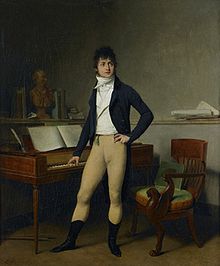| Le calife de Bagdad | |
|---|---|
| Opéra comique by François-Adrien Boieldieu | |
 The composer c. 1800 | |
| Translation | The Caliph of Baghdad |
| Librettist | Claude Godard d'Aucourt de Saint-Just |
| Language | French |
| Premiere | 16 September 1800 Opéra-Comique, Paris |
Le calife de Bagdad (The Caliph of Baghdad) is an opéra comique in one act by the French composer François-Adrien Boieldieu with a libretto by Claude Godard d'Aucourt de Saint-Just. Dedicated to the landscape painter Bidauld it was first performed at the Opéra-Comique, Paris, on 16 September 1800 and soon became highly popular throughout Europe.
It was Boieldieu's first major triumph. One member of the audience who was less impressed was the noted composer Luigi Cherubini who reproached Boieldieu, "Aren't you ashamed of such a great success, and doing so little to deserve it?" Boieldieu immediately applied to Cherubini for lessons in compositional techniques.
Le calife de Bagdad was part of the vogue for operas on Oriental subjects and the music makes use of local colour, especially the overture with its prominent "eastern" percussion. Késie's aria "De tous pays" is a bravura piece which illustrates the musical styles of several European countries, including Spain, Italy, Germany, Scotland and England. Le calife de Bagdad is believed to have influenced Carl Maria von Weber, particularly his operas Abu Hassan and Oberon.